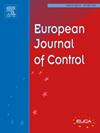A comprehensive control paradigm for prescribed performance attainment in complex nonlinear systems
IF 2.5
3区 计算机科学
Q2 AUTOMATION & CONTROL SYSTEMS
引用次数: 0
Abstract
This paper presents a comprehensive control framework tailored for achieving Prescribed Performance Control (PPC) in the context of complex nonlinear systems, addressing multifaceted challenges prevalent in control design. The focus is on a control scenario characterized by the simultaneous presence of nonlinearity, external disturbances, time delay, and unknown control direction—issues that pose considerable obstacles for existing solutions. To surmount these challenges, our proposed approach integrates well-established techniques, including neural networks, Nussbaum-type gains, and adaptive control strategies within a unified control design framework. The specific technical challenge addressed in this work involves the effective management of these intricate complexities in Single-Input Single-Output (SISO) systems. Our contributions extend the theoretical foundations, presenting an ideal PPC control design and introducing two adaptive neural network-based control methods capable of accommodating both known and unknown control directions. Utilizing Lyapunov–Krasovskii functionals, we showcase a unique integration that surpasses a mere combination of individual techniques. This work advances the theoretical underpinnings of control engineering tailored for real-world scenarios. The proposed controller’s efficacy is validated through rigorous simulations and compared with recent results and benchmark PPC controllers, establishing its superiority in addressing the intricacies of complex control scenarios.
实现复杂非线性系统规定性能的综合控制范例
本文介绍了一个综合控制框架,该框架专为在复杂非线性系统中实现规定性能控制(PPC)而定制,可解决控制设计中普遍存在的多方面挑战。重点在于同时存在非线性、外部干扰、时间延迟和未知控制方向的控制场景--这些问题对现有解决方案构成了相当大的障碍。为了克服这些挑战,我们提出的方法将神经网络、努斯鲍姆型增益和自适应控制策略等成熟技术整合到一个统一的控制设计框架中。这项工作要解决的具体技术难题涉及如何有效管理单输入单输出(SISO)系统中这些错综复杂的问题。我们的贡献在于扩展了理论基础,提出了理想的 PPC 控制设计,并引入了两种基于神经网络的自适应控制方法,能够同时适应已知和未知的控制方向。利用 Lyapunov-Krasovskii 函数,我们展示了一种独特的集成方法,它超越了单纯的单项技术组合。这项工作推进了为现实世界场景量身定制的控制工程的理论基础。我们通过严格的仿真验证了所提出的控制器的功效,并将其与最新成果和基准 PPC 控制器进行了比较,从而确立了它在解决复杂控制场景的错综复杂性方面的优越性。
本文章由计算机程序翻译,如有差异,请以英文原文为准。
求助全文
约1分钟内获得全文
求助全文
来源期刊

European Journal of Control
工程技术-自动化与控制系统
CiteScore
5.80
自引率
5.90%
发文量
131
审稿时长
1 months
期刊介绍:
The European Control Association (EUCA) has among its objectives to promote the development of the discipline. Apart from the European Control Conferences, the European Journal of Control is the Association''s main channel for the dissemination of important contributions in the field.
The aim of the Journal is to publish high quality papers on the theory and practice of control and systems engineering.
The scope of the Journal will be wide and cover all aspects of the discipline including methodologies, techniques and applications.
Research in control and systems engineering is necessary to develop new concepts and tools which enhance our understanding and improve our ability to design and implement high performance control systems. Submitted papers should stress the practical motivations and relevance of their results.
The design and implementation of a successful control system requires the use of a range of techniques:
Modelling
Robustness Analysis
Identification
Optimization
Control Law Design
Numerical analysis
Fault Detection, and so on.
 求助内容:
求助内容: 应助结果提醒方式:
应助结果提醒方式:


